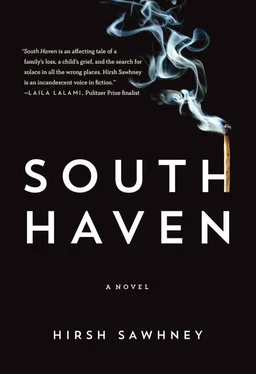Mohan Lal puts down the kettle and smiles a faint smile.
Siddharth steps toward him. Thinks, If he’s making tea, then everything must be okay.
Mohan Lal says, Come here, son.
Where’s Mom? asks Siddharth.
Come here, give your father a hug.
He obeys. Thinks, If she were really dead, Dad wouldn’t be smiling.
Mohan Lal puts his arms around him. Siddharth squirms. He doesn’t like the scratchy feel of wool on his face. And his father smells bad. Like mothballs.
Mohan Lal says, Arjun has told you?
Arjun says, I told him.
Mohan Lal says, Look at this. No tears from my brave son. What a brave young son I have. The bravest boy in the world.
Siddharth lets go of his father and turns to Arjun, who is standing in the doorway that leads to the family room. Tears are pouring out of his brother’s eyes, and he isn’t wiping them away. Siddharth thinks, I’m the brave one. I have to be the brave one. In that moment, the fact that he is the brave one makes it all feel okay.
He missed his mother. He ached for her while he watched television during the month of June. He got to watch a lot of television that month, as Mohan Lal had allowed him to miss his final weeks of classes at Robert Treat Elementary School. The pain didn’t go away in July, during his hellish trip to Delhi. He felt an especially acute longing as he knelt on the cool marble of his uncle’s hot bathroom, puking his guts out into the narrow, too-tall toilet bowl. He had made the mistake of having a Nirula’s pizza and milkshake with one of his cousins, things his mother would have counseled him against eating. His father stood over him in that sour, steamy bathroom and said, “Be brave, son,” occasionally rubbing Siddharth’s back, which made him feel even worse. Afterward, Mohan Lal didn’t put a cold cloth on his forehead, like his mother would have done. His father didn’t pat his head in just the right way, somewhere between gentle and firm. When Siddharth whined about the pain in his stomach, Mohan Lal said, “You made a choice to have that pizza. Now live with the consequences.”
In August, he still longed for his mother. He wished for her to magically reappear while he was brushing his teeth or pouring gasoline into the lawnmower. But he devoted much more of his mental energy to his father, for Mohan Lal was doing so many baffling things. He was drinking. Not like in the movies, but more than before. He drank two or three whiskeys every night, and when he kissed Siddharth goodnight, the bitter odor of alcohol lingered over the bed once he’d left the room. When Mohan Lal kissed Siddharth goodnight, he sometimes said nice things like, “I’m a lucky man to have such good sons,” or, “You’re a wise boy. A sensitive boy — like your mother.” But the things Mohan Lal said could be scary. Once, he said, “Siddharth, my only reason for living is you two. If it weren’t for you boys, it might also be my time to leave this earth.” The night he said that, Siddharth lay awake tossing and turning. Each time the house creaked, or the rhododendron bush outside his window quivered in the wind, he mistook these noises for the sound of his father committing suicide.
Throughout the autumn of his fifth grade year, his father was having trouble waking up in the morning. In fact, Mohan Lal didn’t get out of bed at all on his first day of fifth grade, fifth grade at a brand-new elementary school, so Siddharth had to get ready all by himself. At least Arjun had left out some clothes for him, a pair of corduroys that were too tight now, a striped red T-shirt that was beginning to fray around the collar.
A few weeks later, there was a rainstorm one morning. He tried to wake his father up, so that Mohan Lal could drive him to school. But the man wouldn’t budge. Siddharth kept on shaking him, and his father kept on asking for five more minutes. Eventually, Mohan Lal got out of bed, and father and son went out to the driveway. Siddharth made his way to the backseat of their rust-colored Dodge Omni, where he liked to sit in the mornings. He’d always had trouble opening the Omni’s doors, but now he was older and could do it all by himself. He lifted the tricky handle, up first and then out. The door opened, but then it quickly slammed shut. Mohan Lal revved the engine, and Siddharth looked on in shock as his father sped down the driveway and up Hilltop Drive. Fortunately, the cleaning woman was there to let him back into the house. He sat in the formal living room with his head pressed into the window, wondering if his father would ever return.
Eleven minutes later, Mohan Lal pulled back into the driveway. He hugged Siddharth tightly and kissed him numerous times. He said, “Don’t ever do that again.”
“I won’t,” said Siddharth.
He made sure not to cry, so that his father wouldn’t worry about him. He never told Arjun what had happened that morning, because the last thing his brother needed was another reason to hate their father.
The autumn after Siddharth’s mother died, Arjun was always angry with Mohan Lal. When Mohan Lal instructed the boys to tell the people who called for him that he wasn’t home, Arjun scoffed at him. He said that Mohan Lal needed to stop avoiding people who were trying to help him. When his mother’s friends dropped in with CorningWare dishes full of rajma or tuna casserole, Mohan Lal greeted them at the door and said he was running late for a meeting, so that he wouldn’t have to invite them in. One time, Mustafa, the manager of Mohan Lal’s favorite Italian restaurant, came over with a tray of eggplant parmigiana. As Mustafa stood on the front steps ringing the doorbell, Mohan Lal switched off the television and shushed Siddharth with his finger. Mustafa simply left the food outside the door and drove away. Soon all of these people stopped coming over altogether, and Arjun wasn’t happy about it. He told Mohan Lal that he needed to set a better example for Siddharth. Mohan Lal said, “Mind your own business, Arjun. Remember, I’m your father.”
A part of Siddharth felt good when he saw his brother taking charge. But he also understood his father’s behavior. He could relate to Mohan Lal’s need for privacy. The Connor boys kept on calling him to see if he could come over, but he always said no, that he had too much homework. Sometimes they would come by after school and ring the doorbell, and Siddharth would hide in his bedroom closet until they went away. He didn’t want to hang out with them anymore and swore that he would never return to their house. Their house was his least favorite place in the entire world.
Though Siddharth understood his father’s need for isolation, what worried him was Mohan Lal’s temper: The man’s fights with Arjun were getting worse and worse. Each day, Mohan Lal returned home from Elm City College with news of another fight with his dean. He was even fighting with Barry Uncle, his distant cousin and best friend. His first fight with Barry Uncle had occurred the day before the funeral. Barry Uncle had been going on about the need for a pandit to preside over some rituals — to say something spiritual for the sake of Siddharth’s mother. When two of Siddharth’s aunts who had flown in from India agreed, Mohan Lal lost it. His face went red and he started trembling. He said, “Jesus fucking Christ, Barry. Keep your Brahmin charlatans away from my family. Take your fucking Hinduism and shove it up your ass.” Siddharth had never heard his father say fuck before. Hearing this made him seem like a stranger, like some sort of child abuser. In such moments, Siddharth couldn’t help but think that his only real parent was his mother.
* * *
The big fight with Barry Uncle had occurred in August, after Siddharth’s trip to India with Mohan Lal. Over Little Caesars pizza one night, Barry Uncle said, “Boss, have you thought about the lawsuit?”
Читать дальше












